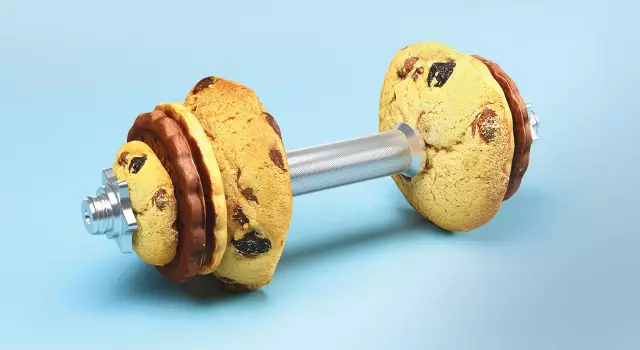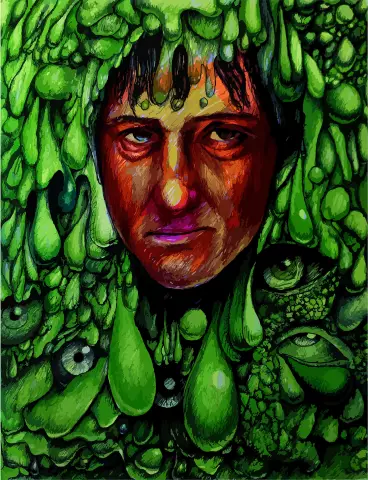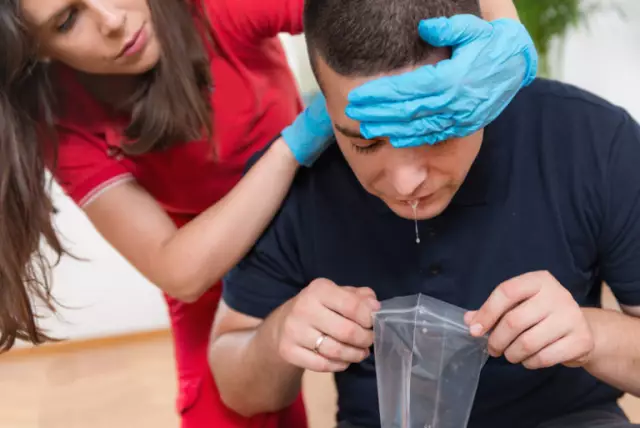- Author Rachel Wainwright wainwright@abchealthonline.com.
- Public 2023-12-15 07:39.
- Last modified 2025-11-02 20:14.
5 unforgivable mistakes in prostatitis treatment
According to the Research Institute of Urology and Interventional Radiology. ON. Lopatkin today, the peak incidence of prostatitis occurs in men aged 25-30 years. As statistics show, over the past 10 years, this unpleasant disease of the male genital area has rapidly grown younger, and this threatening trend continues to grow.

Source: depositphotos.com
Prostatitis is a general name for any inflammatory process in the prostate gland, which can be caused by a variety of reasons: from hypothermia, injury, age-related changes to sexually transmitted infections such as chlamydia. In this case, a man most often suffers not only from the symptoms of the disease itself (pain, difficulty urinating, sexual dysfunction) but also from its complications.
Until recently, it was believed that adenoma (enlargement) of the prostate is not a disease, but a manifestation of the natural aging process of the male body. That this is a male menopause, which awaits any representative of the stronger sex at the age of 65-70 years. However, the situation has now changed dramatically. According to the chief specialist in reproductive health of the Ministry of Health of the Russian Federation, Oleg Apolikhin , a direct link was found between adenoma and how early a man had prostatitis. “Today, the peak incidence of prostatitis occurs at 25-30 years old, which means that by the age of 45-50 such a man will have an increase in the average proportion of the prostate., - the specialist is sure. - It can be considered natural when an adenoma appears after 70 years. Alas, modern men have these problems at a much earlier age, and this trend is increasing."
The intimate nature of the problem, the inattention of young men to their health, an unsportsmanlike lifestyle leave their mark on the picture of the disease, during the treatment of which unforgivable mistakes are often made. These mistakes negate medical efforts, contribute to the development of chronic prostatitis with periodic (at least 2 times a year) very uncomfortable exacerbations. The result for a strong half of humanity is disappointing - an earlier development of prostate adenoma, a violation of the genitourinary system, sexual dysfunctions (erectile dysfunction, impotence) and, finally, infertility. Let's list the main mistakes that men make when faced with this unpleasant and dangerous disease.
Mistake # 1. Inattention to symptoms
Very often men belittle the severity of their ailment, reduce the symptoms to a common cold, as they say: "Kidney chills." The symptoms of cystitis are confused with the manifestation of prostatitis. Not paying attention to the signs of pelvic pain syndrome. In fact, prostatitis is insidious precisely because it is difficult to diagnose it without special examinations. Very often, inflammation of the organs of the genitourinary system, for example, urethritis (inflammation of the urinary canal), turns into inflammation of the prostate gland. Also, almost any sexually transmitted disease (for example, gonorrhea, chlamydia) can lead to inflammation of the prostate. We recommend you take an online test to be sure that prostatitis is not about you. Better yet, visit your urologist periodically and check your prostate.

Source: depositphotos.com
Mistake # 2. Self-medication with untested drugs
Due to the fact that men do not like to go to doctors and tend to self-medicate, it is easier to deceive them. The Internet is replete with offers of "magic" pills, dietary supplements under the guise of drugs and miracle devices that guarantee absolute recovery and instant effect. At best, they are harmless - just a waste of time that can be spent on effective treatment; at worst, they are counterfeits and counterfeits that are dangerous to health. Therefore, always check the purchased medicines for the presence of a registration certificate, for example, on the website of the State Register of Medicines.
It is also very important that the drug not only relieves symptoms, but also promotes the restoration of prostate tissue. Not all drugs are capable of this. Peptide drug complexes, which have been used in official medicine for over 20 years, have proven themselves well. They contain an extract from the tissues of the prostate gland of animals, which has an organotropic effect, as well as amino acids and microelements necessary for the prostate. Such drugs not only quickly relieve inflammation, but also promote the regeneration and restoration of prostate tissue.

Source: depositphotos.com
Mistake number 3. Refusal of specific treatments
Often, the representatives of the stronger sex begin to "play up" when the doctor prescribes a comprehensive course of treatment for them according to the medical standards of evidence-based medicine. The patient may refuse to massage the prostate, from periodic medical examinations, from the use of drugs taken rectally (in the form of suppositories). But it is on them that 70% of success in the fight against the disease depends.
It seems, what is easier: I drank a pill, and "the prostate will pass …" Unfortunately, this is far from the case. Tablets and capsules have a big drawback: they quickly dissolve in the digestive system, while their active ingredients are mostly filtered by the kidneys and liver, and never reach the prostate. And the effectiveness of such "treatment" tends to zero.
Urologists recommend using rectal suppositories for the treatment and prevention of prostatitis, which can easily deliver the drug to the site of inflammation. The active substance enters the bloodstream through the mucous membrane, which is then picked up by the lymphatic system. So in the shortest way, the medicine goes to the prostate and has a direct restorative effect on it. For example, in the drug substance of rectal suppositories "Forgiven", in addition to natural peptides (extract from the prostate tissue of young bulls), the composition contains dimexide (dimethyl sulfoxide), which has a local analgesic and anti-inflammatory effect. It also improves microcirculation in tissues, which allows drugs to be absorbed better and faster into the prostate gland. And substances such as glycine and zinc not only reduce edema, but also prevent the accumulation of leukocytes in it and remove stagnant secretions.

Source: depositphotos.com
Mistake # 4. Abstinence or abuse of sex
Often, representatives of the stronger sex, faced with the problem of prostatitis, significantly reduce their sexual activity, or even completely refuse intimacy. This is not entirely prudent. The fact is that during sex, many muscles contract, which at other times simply do not work, blood flow in the pelvic organs increases, the production of male sex hormones is stimulated - all this helps the prostate get rid of stagnation. The other extreme - excessive and unprotected sex - is also not desirable, because can provoke an increase in inflammatory processes in the prostate gland. The truth, as always, is in the middle. Regular sex with a regular partner (with mandatory ejaculation) contributes to a speedy recovery, despite not always pleasant or "worn out" sensations during the act of love. Besides,having sex regularly is the best prevention of prostatitis.

Source: depositphotos.com
Mistake # 5. Improper use of rectal suppositories
Rectal suppositories for prostatitis can be used independently at home. However, this procedure is not the most pleasant and requires compliance with certain rules. It happens that the patient stops the course due to inconveniences during treatment, such as diarrhea. Most often, the reason is that the patient did not cleanse the intestines before the procedure using microclysters in a volume of 200-300 ml. Any rectal suppositories have a laxative effect. To avoid unpleasant consequences - first, be sure to do an enema and only then use candles. So the candle "Prostatilen",before the procedure, moisten with water. It is necessary to use candles every day at a certain time, 3-4 hours after a meal. The course of treatment is at least 10 days for chronic prostatitis and at least 15 days for benign prostatic hyperplasia.
Found a mistake in the text? Select it and press Ctrl + Enter.






